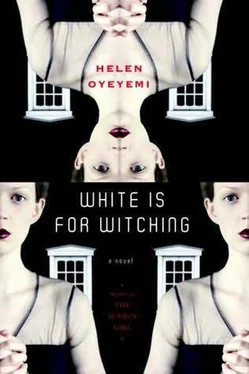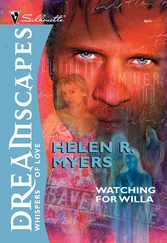Believe it, don’t believe it, as you will. Of course there is the idea that Anna caught Jennifer and tried to stop her from leaving, that the two fought, that Jennifer strangled to death in a circle made of Anna’s fingers. But that is unrealistic for a number of reasons. And besides, without a corpse there is no proof of what may have come
before
Lily died Eliot and Miranda had gone to school separately, Eliot coasting away on his bike each morning, leaving Miranda to inch sedately schoolwards in heels so high and thin that they would have got jammed in bicycle pedals. But Eliot walked Miranda to school on her first day back. As usual he had a half-pint bottle of full-fat milk sticking out of his blazer pocket. It bobbed as he walked. For some reason Eliot and all the boys he knew at school drank copious amounts of milk straight from the bottle. When they finished their first bottle, they’d all be at the cornershop at breaktime, buying more. No matter which one of the boys you asked why, he’d only knock his forehead with his knuckles and say, without smiling, “For the bones.”
Miranda asked if she could try some of the milk. Eliot obliged her without comment and nodded sagely when she wrinkled her nose and said, “It’s just milk.”
At assembly she realised she’d forgotten her hymnal at home. She looked around helplessly as the head of the sixth form approached. Appealing to him would have no effect. On Monday mornings he handed out detentions to people who weren’t holding small books covered in red leather, and that was all. Help came unexpectedly; a hymnal landed in her lap and she hurriedly opened it and sang loudly until the teacher had passed. When she searched the row of girls for her saviour, Emma Roberts, safe in an area that had already been patrolled, smiled at her and held up a little note that said: Welcome back . Emma’s hair was almost as short as Miranda’s; it made her look much less substantial than she had before; the heavy gold hearts she wore in her ears seemed to weigh her down. Miranda suddenly realised that Eliot wasn’t sitting beside Emma. She decided that he must have bunked assembly. Everyone knew that Eliot and Emma always sat together — they’d so comfortably and easily brought their mutual crush from the playground to lower school and from lower school to sixth form. You couldn’t picture Eliot with his arm around the back of anyone else’s chair, or Emma throwing fries like darts at any other boy. Eliot could be tricky, but Emma made him simpler for everyone. Miranda saw him now, two rows ahead, beside Martin. She didn’t look at Emma again for the rest of assembly, not even when the headmaster read aloud a list of upper sixth formers who’d had Oxford and Cambridge offers and she desperately needed someone vaguely friendly to lock eyes with. All the girls on Miranda’s row eyed her with great curiosity, and, when Tijana’s name was called, the same was done to Tijana in the row in front. Miranda looked at the back of Tijana’s head and felt worried. Tijana had been part of the pack of girls who had chased their car after she was released from the clinic. Tijana, sitting cross-legged in her chair, popped up the collar of her school shirt. The headmaster stood on the varnished stage, with a large portrait of the queen behind him and a marble crucifix to the right of him, and he started clapping. It took everyone a second to follow his lead. Miranda reddened and was glad that she’d chosen a more low-key lipstick that day, a dark pink that matched the inside of her mouth. She was okay intelligence-wise, but she knew that she wasn’t as clever as Eliot. One of the teachers had said that Oxbridge looked for teachability. So it must be that she was more teachable than Eliot. She could picture Tijana at Cambridge, though, grey hood pulled up over her head as she moved through the stone arches with calm eyes.
When the bell rang for lunch, Miranda unchained Eliot’s bike and rode downhill and then uphill again, feeling the wheels cling to the earth’s descent as shops shot by, and the dour water that split Bridge Street. A couple of white gulls raced her, their wings flapping about her head. The only way she could ride a bike in shoes like hers was fast, legs pumping in a way that outwitted the conspiracy of pegs and holes. She stopped when the ground jutted and sent her body leaning back, protesting the steepness. She got off the bike and drew it along behind her. She heard and smelt the water at the bottom of the cliffs, but it felt like a long time before she’d walked long enough to glimpse the sea crashing and breaking against the shore, foam eating into stone. England and France had been part of the same landmass, her father had told her, until prised apart by floods and erosion.
She was not sure what time it was; when she looked at the sun she could understand that it had changed position but she did not dare to say how much. There were cruise ships coming in, vast white curved blocks like severed feet shuffling across the water. She waved halfhearted welcome. She felt the wind lift her hair above her head. In daylight the water was so blue that the colour seemed like a lie and she leant over, hoping for a moment of shift that would allow her to understand what was beneath the sea. Was this where the goodlady lived? That was how you caught a magical creature, you found out where it lived and you laid traps for it.
Her hands were pinned behind her and she was knocked down by a deft kick to the back of her knee. All this was done in complete silence. She lay and frowned into the grass, began to get up and was stopped by the fact of a knife held near her face. It was so sharp. Where it cut, her flesh would hang neatly but separated, like soft dominoes.
“Oh God,” said Miranda. “Come on. Really?”
A girl she recognised but had never spoken to was crouched by her, holding the knife. She was one of the Kosovan girls. The girl hissed at her. “Why don’t you stay away from our boys?”
Miranda said, “May I get up, please?” She was lying on her front and it was hurting her neck to have to look up so steadily.
“No, you certainly may not,” the girl said, mimicking Miranda’s accent. Then she grew serious again. “Did you hear me? I said, why don’t you stay away from our boys?”
“I don’t know what you’re talking about.”
Another girl came into view, looking so much like the first girl that Miranda thought she might be hallucinating.
“We saw you,” the second girl said. “You and Amir, you and Farouk, you and Agim, you and whoever. Then they end up getting stabbed.”
Miranda thought about screaming. But she’d never been one for raising her voice, and an unpractised scream would just dissolve into seawater.
Instead she said, “Listen, I really don’t know what or whom you are talking about. You have mistaken me for someone else.”
Tijana appeared behind the first two girls.
Miranda said, “Tijana—”
“Agim is my cousin .” She said it flatly, and she said it in such a way that Miranda understood that these girls really and truly meant to hurt her. She struggled to her feet, and the girls were around in a tight circle, their arms linked. Their hair, which looked so rigid, was soft and greasy and synthetically perfumed. Miranda gagged, and they rocked her, the three of them, rocked her close enough to the cliff edge to make her stutter, “Don’t, please don’t.”
“Agim is my cousin,” Tijana repeated.
“Who is Agim?” Miranda asked, desperately.
Silence and adamant eyes.
“I’ve been away for months,” Miranda babbled. “Doing my lessons in bed. I’ve been… away. If you’re talking about the stabbings I’ve no idea…”
Tijana looked into Miranda’s eyes and seemed, for the first time, unsure.
Читать дальше












